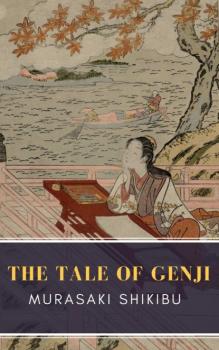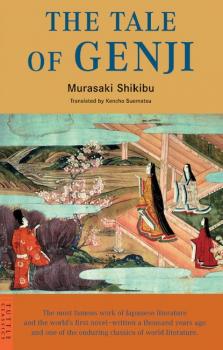Murasaki Shikibu
Список книг автора Murasaki ShikibuThe Tale of Genji
"The Tale of Genji" by Murasaki Shikibu (translated by Arthur Waley). Published by Good Press. Good Press publishes a wide range of titles that encompasses every genre. From well-known classics & literary fiction and non-fiction to forgotten−or yet undiscovered gems−of world literature, we issue the books that need to be read. Each Good Press edition has been meticulously edited and formatted to boost readability for all e-readers and devices. Our goal is to produce eBooks that are user-friendly and accessible to everyone in a high-quality digital format.
The Tale of Genji
The Tale of Genji (源氏物語 Genji monogatari) is a classic work of Japanese literature written by the noblewoman and lady-in-waiting Murasaki Shikibu in the early years of the 11th century. The original manuscript no longer exists. It was made in «concertina» or «orihon» style: several sheets of paper pasted together and folded alternately in one direction then the other, around the peak of the Heian period. The work is a unique depiction of the lifestyles of high courtiers during the Heian period, written in archaic language and a poetic and confusing style that make it unreadable to the average Japanese without dedicated study. It was not until the early 20th century that Genji was translated into modern Japanese, by the poet Akiko Yosano. The first English translation was attempted in 1882, but was of poor quality and incomplete.
The work recounts the life of Hikaru Genji, or «Shining Genji», the son of an ancient Japanese emperor, known to readers as Emperor Kiritsubo, and a low-ranking concubine called Kiritsubo Consort. For political reasons, the emperor removes Genji from the line of succession, demoting him to a commoner by giving him the surname Minamoto, and he pursues a career as an imperial officer. The tale concentrates on Genji's romantic life and describes the customs of the aristocratic society of the time. It is sometimes called the world's first novel, the first modern novel, the first psychological novel or the first novel still to be considered a classic. While regarded as a masterpiece, its precise classification and influence in both the Western and Eastern canons has been a matter of debate.
Diaries of Court Ladies of Old Japan
"Diaries of Court Ladies of Old Japan" by Murasaki Shikibu, Sugawara no Takasue no Musume, Izumi Shikibu (translated by Kochi Doi, Annie Shepley Omori). Published by Good Press. Good Press publishes a wide range of titles that encompasses every genre. From well-known classics & literary fiction and non-fiction to forgotten−or yet undiscovered gems−of world literature, we issue the books that need to be read. Each Good Press edition has been meticulously edited and formatted to boost readability for all e-readers and devices. Our goal is to produce eBooks that are user-friendly and accessible to everyone in a high-quality digital format.
The Tale of Genji (Abridged)
"The Tale of Genji" by Lady Muraski is one of the world's most influential novels. As the first psychological novel, «The Tale of Genji» delves into the motivations and thoughts of the main characters, which had never been done in previous novels. The famous Japanese story is about Genji, the son of an emperor. When his mother died, Genji's father married another woman who greatly resembled Genji's mother. However, Genji fell in love with his new stepmother, causing problems between him and his own wife. He pursues a number of affairs, and is eventually exiled from the Capitol to a small, rural town. While Lady Murasaki did not base «The Tale of Genji» on a true story, she was inspired by a Minister in the royal court. She wrote the story in small installments for the ladies of the court, which might explain why the story was never «finished;» Lady Murasaki intended to keep the stories going as long as she possibly could. She also created some of the most memorable female characters in literature. As such, «The Tale of Genji» is widely considered to be one of the greatest works in the Japanese literature canon, as well as one of the most influential works of storytelling. Contained in this volume is the abridged translation of Suematsu Kencho.
Genji Monogatari
Genji Monogatari (The Tale of Genji) is the Japan's earliest novel and the most famous work in Japan's literary history. It remains the finest portrayal of court life in the classical Heian period, some ten centuries ago. The author, Murasaki Shikibu (Lady Murasaki) was a member of the celebrated Fujiwara clan, which virtually created the history and culture of the Heian age.The novel has for its theme the many loves of the radiantly charming Prince Genji, son of the emperor and paragon of the ladies of the court. But its underlying motif is the fleeting nature of life in a transient world of beauty and grace, of love and enmity. It is an incredibly absorbing tale, distinguished by the author's amazing insight in her treatment of human personality and human events.Its diversity of characters and its subtle inquiries into the meaning of life make it one of the most significant and memorable of books. Some have compared it with Proust's Remembrance of Things Past, and certainly there is validity in the comparison. It most decidedly deserves its place among the world's foremost literary classics. Genji Monogatari, an immensely long novel, is presented here in an abridged translation.
Tale of Genji
"What Waley did create is literary art of extraordinary beauty that brings to life in English the world Murasaki Shikibu imagined. The beauty of his art has not dimmed, but like the original text itself retains the power to move and enlighten."—Dennis Washburn, from his foreword Centuries before Shakespeare, Murasaki Shikibu's The Tale of Genji was already acknowledged as a classic of Japanese literature. Over the past century, this book has gained worldwide acceptance as not only the world's first novel but as one of the greatest works of literature of all time.The hero of the tale, Prince Genji, is a shining example of the Heian-era ideal man—accomplished in poetry, dance, music, painting, and, not least of all to the novel's many plots, romance. [i]The Tale of Genji and the characters and world it depicts have influenced Japanese culture to its very core. This celebrated translation by Arthur Waley gives Western readers a very genuine feel for the tone of this beloved classic.This edition contains the complete Waley translation of all six books of [i]The Tale of Genji and also contains a new foreword by Dennis Washburn with key insights into both the book and the importance of this translation for modern readers.






